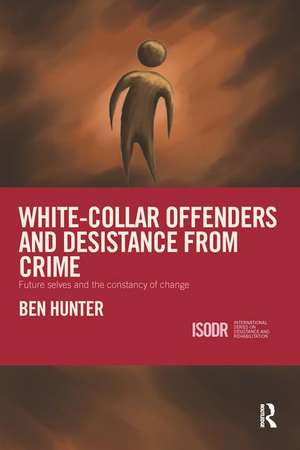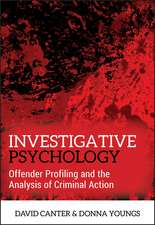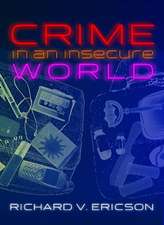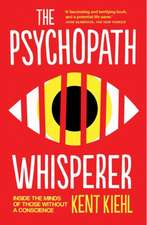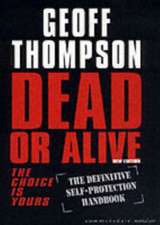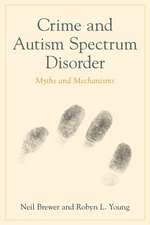White-Collar Offenders and Desistance from Crime: Future selves and the constancy of change: International Series on Desistance and Rehabilitation
Autor Ben Hunteren Limba Engleză Paperback – 30 noi 2016
This study rectifies this omission by drawing upon white-collar offenders’ own accounts of their punishment and their attempts to make new lives in the aftermath of it. Detailing the impact of imprisonment on white-collar offenders, their release from prison and efforts to be successful again, this book outlines the particular strategies white-collar offenders used to cope with the difficulties they encountered and also analyses the ways they tried to work out ‘who they were’ in the post-release worlds they found themselves in.
Representing the first sustained qualitative study of white-collar offenders and desistance from crime, this book will be of interest to academics and students engaged in the study of white-collar crime, desistance from crime and prison. The insights it offers into a particular group of offenders’ experience of criminal justice would also make it useful for criminal justice practitioners and anyone who wishes to understand the challenges faced by a group of offenders who are assumed to have many advantages when it comes to desisting from crime.
| Toate formatele și edițiile | Preț | Express |
|---|---|---|
| Paperback (1) | 430.80 lei 43-57 zile | |
| Taylor & Francis – 30 noi 2016 | 430.80 lei 43-57 zile | |
| Hardback (1) | 1056.32 lei 43-57 zile | |
| Taylor & Francis – 17 mar 2015 | 1056.32 lei 43-57 zile |
Din seria International Series on Desistance and Rehabilitation
-
 Preț: 310.84 lei
Preț: 310.84 lei - 9%
 Preț: 1005.06 lei
Preț: 1005.06 lei -
 Preț: 310.51 lei
Preț: 310.51 lei - 9%
 Preț: 1005.14 lei
Preț: 1005.14 lei -
 Preț: 308.93 lei
Preț: 308.93 lei -
 Preț: 406.97 lei
Preț: 406.97 lei -
 Preț: 385.25 lei
Preț: 385.25 lei -
 Preț: 434.83 lei
Preț: 434.83 lei - 9%
 Preț: 904.00 lei
Preț: 904.00 lei -
 Preț: 385.62 lei
Preț: 385.62 lei -
 Preț: 449.41 lei
Preț: 449.41 lei -
 Preț: 416.22 lei
Preț: 416.22 lei -
 Preț: 392.50 lei
Preț: 392.50 lei -
 Preț: 484.69 lei
Preț: 484.69 lei -
 Preț: 389.38 lei
Preț: 389.38 lei - 21%
 Preț: 257.76 lei
Preț: 257.76 lei -
 Preț: 411.64 lei
Preț: 411.64 lei -
 Preț: 233.25 lei
Preț: 233.25 lei - 5%
 Preț: 1160.70 lei
Preț: 1160.70 lei -
 Preț: 464.76 lei
Preț: 464.76 lei -
 Preț: 341.86 lei
Preț: 341.86 lei -
 Preț: 389.66 lei
Preț: 389.66 lei -
 Preț: 349.71 lei
Preț: 349.71 lei - 17%
 Preț: 258.70 lei
Preț: 258.70 lei - 18%
 Preț: 1000.87 lei
Preț: 1000.87 lei - 18%
 Preț: 1000.58 lei
Preț: 1000.58 lei - 18%
 Preț: 946.93 lei
Preț: 946.93 lei - 18%
 Preț: 1061.84 lei
Preț: 1061.84 lei -
 Preț: 388.13 lei
Preț: 388.13 lei - 5%
 Preț: 1047.47 lei
Preț: 1047.47 lei
Preț: 430.80 lei
Nou
82.44€ • 85.75$ • 68.06£
Carte tipărită la comandă
Livrare economică 14-28 aprilie
Specificații
ISBN-10: 1138288551
Pagini: 226
Ilustrații: 3 black & white illustrations, 17 black & white tables, 3 black & white line drawings
Dimensiuni: 156 x 234 x 12 mm
Greutate: 0.33 kg
Ediția:1
Editura: Taylor & Francis
Colecția Routledge
Seria International Series on Desistance and Rehabilitation
Locul publicării:Oxford, United Kingdom
Public țintă
Postgraduate and UndergraduateCuprins
Notă biografică
Recenzii
‘This book makes a significant contribution to criminological debates concerning identity, existentialism, white-collar crime and desistance. Drawing on a range of published autobiographical accounts, Ben Hunter’s existential approach critically examines how white-collar offenders’ sense of self-identity is challenged and reconstructed by their experiences of both imprisonment and resettlement. This is a fascinating and unique study of deviant identities, and is a book I will certainly be recommending to students and colleagues.’ - James Hardie-Bick, Lecturer in Sociology and Criminology, University of Sussex, UK
"Hunter is to be commended for his skilful integration of developing desistance theories with a subjective analysis of white-collar criminals. Further, his use of existential sociology and autobiographical accounts is original and provides novel insights...Hunter’s text is a valuable contribution to understanding the experiences of white-collar criminals throughout the stages of imprisonment, release and resettlement. It is thoughtful and well researched and will no doubt encourage further qualitative studies into white-collar crime and desistance." - Nicholas Simpson, Current Issues in Criminal Justice
Descriere
The MPs' expenses scandal in England and Wales and the international banking crisis have both brought into focus a concern about 'elite' individuals and their treatment by criminal justice systems. This interest intersects with a well-established concern within criminology for the transgressions of such offenders. However, up until now there has been little sustained consideration of what happens to such offenders following conviction and little discussion of how they attempt to avoid reoffending in the wake of their punishment.
This study rectifies this omission by drawing upon white-collar offenders' own accounts of their punishment and their attempts to make new lives in the aftermath of it. Detailing the impact of imprisonment on white-collar offenders, their release from prison and efforts to be successful again, this book outlines the particular strategies white-collar offenders used to cope with the difficulties they encountered and also analyses the ways they tried to work out 'who they were' in the post-release worlds they found themselves in. Representing the first sustained qualitative study of white-collar offenders and desistance from crime, this book will be of interest to academics and students engaged in the study of white-collar crime, desistance from crime and prison.
The insights it offers into a particular group of offenders' experience of criminal justice would also make it useful for criminal justice practitioners and anyone who wishes to understand the challenges faced by a group of offenders who are assumed to have many advantages when it comes to desisting from crime.
